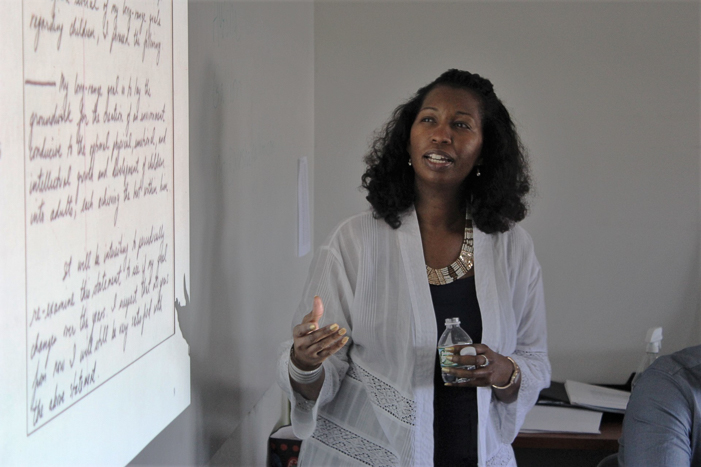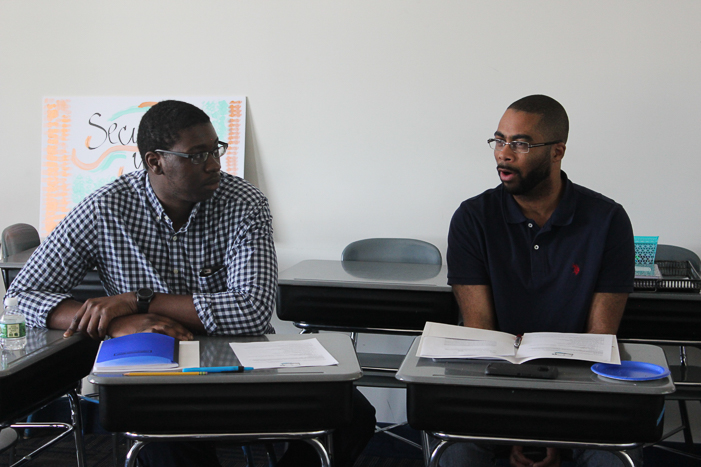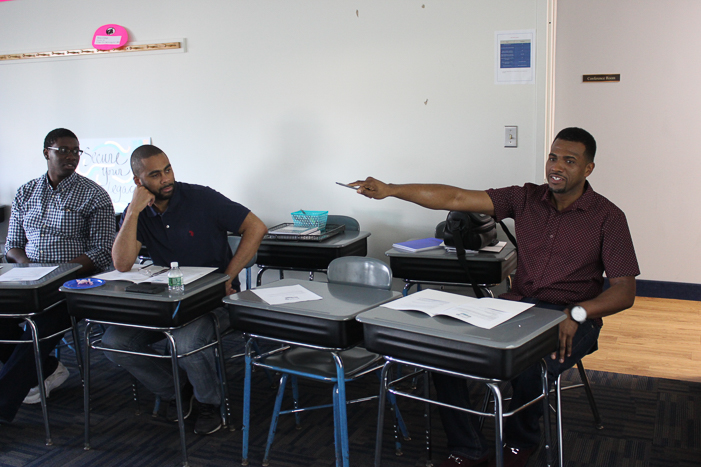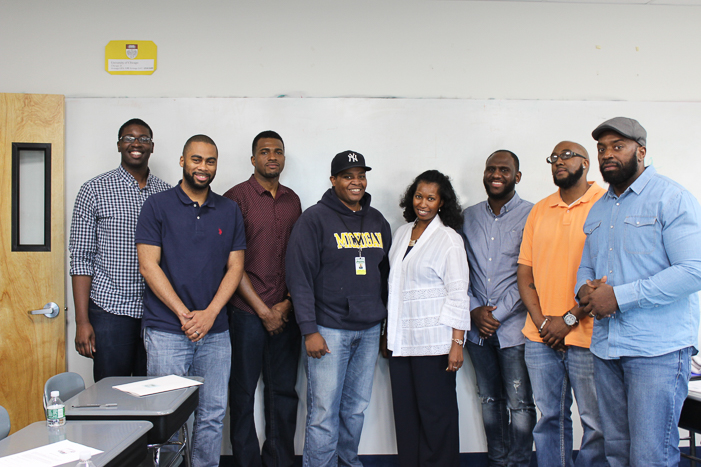A note from the author: I am the woman who founded Distinguished Archives, a journaling workshop service, and I facilitated this workshop specifically with men of color in mind, although all men are welcome. The experience, to say the least, has been an honor.
Jasonn Denard, a married father of two, shared that he hadn’t seen his father for 28 years until last summer. Luckily, because his father was still alive, the Newark high school administrator was able to ask his father questions and gain some insight regarding the many years of absence.
“There was no history, no documentation of things that he had gone through, his accomplishments, his success, God forbid he was no longer here, those questions would have never been answered,” Denard said.
“Through journaling, men of color are able to answer the unasked questions of our children.”
Denard was an attendee at The Blueprint Series: A Journaling Workshop for Men, this past June in Newark, New Jersey.

On a Saturday afternoon in June, I lugged materials into the high-rise office building on Broad Street in Newark. There were composition notebooks, my laptop, champagne flutes, folders, and several overlapping prayers that my mission to facilitate The Blueprint Series would be effective and coherent. I had never heard of a journaling workshop geared toward men of color, and here I was pursuing another one of my projects, Leo-style, ready to make it happen, and grateful that it was indeed happening in Renaissance City.
My idea to facilitate an all-men’s journaling workshop surfaced during the winter of 2016. Later on that summer after the murder of Philando Castile, a well-beloved professional in the foodservice and educational industries, I knew it had to be done. In the blink of an eye Castile was killed, in front of his partner, and even worse, a child. What did we know about him other than what secondary sources—for better or for worse—shared with us?
For every man who has lived there should be a document authored from his own perspective, for the purpose of his own wellness. And, if he so chooses, those volumes with his insight, knowledge, intellectual property, financial developments, and travels should be passed down and archived within his family or community.
I remember asking the attendants of the workshop that afternoon, “How many of you have access to the journals of your fathers? Grandfathers? Uncles?”
We looked around at each other, hopeful that maybe someone was privileged enough to raise his hand. No one did.
When I began planning The Blueprint Series, I was hesitant. Who do you think you are? I said to myself. Girl, you crazy. There was only one way to find out if I was: I asked men about my idea. And in some of the most honest interviews and conversations they all let me know that I was perfectly sane.
Roscoe Coleman, a chef and owner of his own catering establishment in Irvington, New Jersey, showed me the very journals he used in sustaining the operations of his business. At the same time, he lamented having lost his father, who passed away at an early age. His father did not keep a journal. “I would have like to have known how he felt about marriage, about fatherhood,” said Coleman.
New York native Kennard Perry, a clothing designer and barber in Baltimore, where he graduated Morgan State University, is no stranger to the narratives of black men. At Nile Style Barbershop, where he practices his craft, haircuts are just one of the services offered. Men are often invited to forums hosted at the shop, so I knew that if anyone would have some insight, Perry would. “Do you think that black men would take journaling direction from a woman? Far less even journal at all?” I asked him. To which he replied, “I do. Men need a safe space where they can be vulnerable. This is a good idea. Let me know how I can help.” And I could tell he was dead serious. In fact, every single man I asked to interview or speak to did so without any reservation.
I spoke with Shariff James of Mission Entertainment, a well-established promoter of events at upscale venues in northern New Jersey. On the surface, it may appear that in between throwing parties at the Meadowlands Racetrack and investing in real estate that there is no vulnerability beneath the outward grind and hobnobbing but James talked to me about life as a father, a husband, and a brother who helped raised his siblings while facing the direst of circumstances. The burgeoning motivational speaker noted that the journals of Black men are their historical data. “Our communities are actually taking a financial blow when our men don’t leave blueprints behind, far less use tools like journals for self-reflection. It’s a way for us to reach back out to those who are coming up behind us and who are crying out for help. Our ability to self-assess is of high value,” he said.
I spoke to men of all ages and backgrounds, and while a few candidly shared that they simply didn’t make time to journal, it was clear that they also did not know the value of journaling because it was not a family tradition, unlike other cultures who have sustained the history of their forefathers through tools such as journals and daily logs.
“Your story matters and I know that you don’t look like it now but you are all someone’s forefather,” I said to the men sitting in the workshop that June afternoon. “You can’t keep all of your daily revelations and budgets and theories all in your head. How many of you have friends who have shared ideas that they never wrote down? How many of them accomplished those ‘great ideas’?”
In that workshop was every kind of brilliance one could imagine. A young man whose internship at MTV would start on Monday; a father of four, who shared that he made troubling choices after his time in the military; and an educator/sales rep who had never journaled in his life were present, in addition to the other attendees, all representative of the best of humanity’s resilience.

From using a journal to deconstruct operations (profession, finances, health) to recording the beginnings of intellectual property, I led the participants in exercises that were preceded by research and exemplars related to journaling but surprisingly spanned subjects such as architecture, sunflower seeds, and patents. I wanted to make sure the experience wasn’t a snorefest but at the same time, it was my responsibility to impart information to substantiate the practice in the eyes of busy men.
Before he left, one attendee shared that the workshop had prompted him to begin journaling for the sake of his children, one entering a master’s program, and the other entering 12th grade. He solemnly said to the group, “I realize that I haven’t written one word to pass on to my children.”

And being a woman didn’t have any negative effects on conveying the information or leading the workshop. I simply was an educator, and the attendees, seekers of information. They wanted to understand why their concepts and everyday experiences should be written down versus condensed and stagnant in their minds. I gave them answers and guided them through writing exercises.
We, did, however, end our workshop with a toast: sparkling lemonade with elderberry and rose in glass flutes. I’m cool with chalking that up to me being a woman, but these men undoubtedly needed to be celebrated in that moment, and I wanted to conclude the two-hour workshop by reinforcing that notion.
A man who keeps a journal is offering himself and family the very history that many of us do not have from our forefathers. Journaling as a tradition among black men, and men of color worldwide, is one of the safest spaces to assert an authentic voice that is not filtered by any secondary intermediaries. It is an act that equates the acceptance of the roles of forefather, pioneer, and innovator.
I am positive that journaling will allow 21st century Black men to secure their legacies, clear their minds, and fortify communities of color in a way that those of us in the United States, and eventually throughout the world, have never experienced.

Workshop photos by RLS Metro Breaking News
